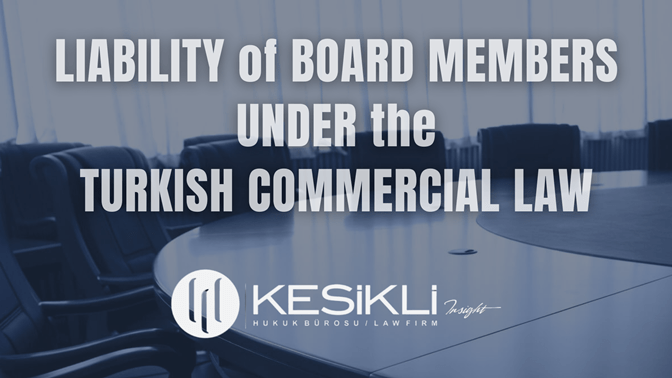A. INTRODUCTION
Management and representation of joint stock companies are carried out by the board of directors. Hence, the board of directors is considered as one of most important organs of joint stock companies having broadest representation powers. In this context, the company is managed and represented by the board of directors for the life of a joint stock company.
The board members have certain liabilities arising out of performance of their duties of management and representation of the company. . In case of violation of these obligations with fault, pursuant to the provision of Turkish Commercial Code No. 6102 (“TCC”) Article 553/1; the board members may be held liable for the damages they cause to the company, the shareholders and the creditors of the company.
B. GENERAL OBLIGATIONS ARISING FROM LAW
The board members are subject to the obligations set forth in the TCC, upon their election to the board of directors. In addition to the obligations in the TCC, it is possible to impose other obligations on them through articles of association of the company. This article will only touch upon some of the general obligations of the board arising out of the TCC and the standard of care that should be exercised by the board members. We would like to not that there are other obligations imposed by the pursuant to the special provisions of the TCC or market specific laws and regulations which could be applicable based on the activity areas of the company.
Senior Management and Supervision of the Company
Since the board of directors is the executive body of the company, the board members are responsible for participating in the management decisions of the company and supervising the implementation of these decisions. This obligation does not extend to an interpretation to mean decisions regarding all kinds of operations of the company in every single detail are given or supervised strictly by the board of directors. As a matter of fact, with the phrase "senior management" in the meaning of TCC 375/1/a and the phrase “senior supervision” in the meaning of TCC 375/1/e gives an idea about the extent of involvement by the board of directors in management and oversight.
Not Entering into Transaction with the Company and Not Borrowing from the Company
Pursuant to TCC 395/1, the board members cannot enter into a transaction with the company on behalf of themselves or anyone else without obtaining permission from the general assembly; otherwise, the company may claim that the transaction is invalid. On the other hand, the aforementioned board member claim that the transaction is invalid.
According to the second paragraph of the same article, the board members apart from shareholders are prohibited from borrowing cash from the company. Likewise, it is clearly regulated that the company cannot provide surety, guarantee and assurance for non-shareholder board members and cannot take over the debts of these board members. In case of a breach of this obligation, the TCC allows the creditors of the company to directly start debt enforcement proceedings against the relevant board members regarding the respective amounts owed to the company.
Non-compete with the Company
Pursuant to the Article 396/1 of the TCC, the board members are prohibited from directly or indirectly performing the commercial affairs that fall within the scope of the company’s field of operation. Board members may perform the aforementioned transactions in accordance with the law only with the permission of the general assembly or in case where the articles of association of the company provides for such provision allowing the board members to compete with the company . Without the permission of the general assembly, the board member who carries out commercial affairs within the scope of the company's field of operation, will breach this obligation.
Duty of Care and Obligation of Loyalty
Pursuant to Article 369/1 of the TCC, the board members are obliged to fulfill their duties with the care of a prudent manager and to protect the interests of the company. Board members are obliged to comply with this duty of care, both when fulfilling their obligations arising out of the law or the articles of association and during the management and representation of the company. According to the rationale of Article 369 of the TCC, a “prudent manager” mentioned in the Code should be considered within the context of “business judgment rule” which term found its roots from the US commercial law. In this context, merely the fact that a decision of the board of directors turns out to be unfavorable to the company, does not give rise to the liability of the board of directors. If the board members can demonstrate that they exercised due care expected from a prudent business man, and gave a decision on fully-informed basis, obtaining the required technical, financial and legal advice and acted for the best interests of the company in their opinion even if the result of the decision is against the compan’s benefits , such a judgment cannot be considered as violation of the duty of care. However, it should be highlighted that the business judgment rule is a principle that is foreign to Turkish Law, as it was derived from the Common Law system. Accordingly,the high court judgments are expected to shape application of this rule.
Article 369/1 of the TCC also regulates the obligation of loyalty. This obligation is imposed by the following part of such article: “to protect the interests of the company in accordance with the rule of honesty”. The board members are obliged to prioritize the interests of the company and to avoid actions that may harm the company while performing the management and representation of the company. In addition, the board members have obligations of confidentiality arising from their loyalty obligations.
C. BREACH OF OBLIGATIONS AND LIABILITY
If the board members violate their obligations arising from the law or the articles of association with fault and the company, the shareholders or the creditors suffer damage due to this violation, the board members with fault are held liable. If the damage of the company has occurred, the company or each shareholder has the authority to file an action for compensation. In this case, the court will decide on the amount of the compensation entitled by the company. If the damage is caused directly to the relevant shareholder or creditor, the shareholde or creditors has the authority to demand that the compensation be paid directly to him. If more than one board members are responsible for the damage, the responsibilities of these board members are determined pro-rata to their respective faults causing the damage.
The action for legal liability against the board members, must be filed before the Commercial Courts of First Instance where the principal place of business of the company is located. The statute of limitations for this action is regulated in Article 560 of the TCC as follows:
“The right to claim compensation against those responsible becomes barred by prescription after two years from the date when the plaintiff learned the damage and the responsibles, and in any case five years from the date of occurrence of the act that caused the damage. In so far, if this act necessitates a penalty in the meaning of criminal law and is subject to a longer statute of limitations regarding Turkish Penal Code, this statute of limitations shall apply to the compensation case.”
D. CONCLUSION
In case the board members of the company violate their obligations arising from the law and the articles of association, they are responsible for the compensation of the damages of the company, shareholders or creditors due to this violation. Whether a fault is attributable to the board members should be determined according to the “business judgment rule” imported from the common law system to Turkish Law. .
@Ömer Kesikli
Let's Get Connected!



